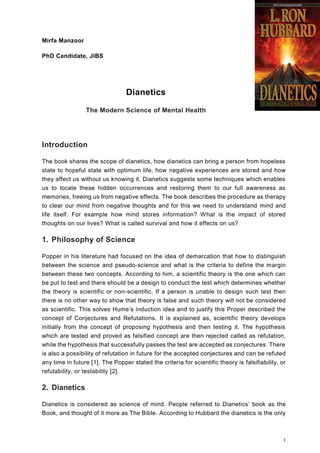Dianetics Fundamentals Explained
Wiki Article
How Dianetics can Save You Time, Stress, and Money.
Table of ContentsSome Known Details About Dianetics The 25-Second Trick For DianeticsThe 8-Second Trick For DianeticsNot known Details About Dianetics
I couldn't ever not wish to get anything that comes to mind for you- if it was otherwise, I wouldn't be resting right here with you, doing this. I not just can never ever have an issue, or not intend to hear something that comes to mind for you, yet I'm totally eager to recognize every idea, every thought, every picture or feeling that emerges or materializes for you- don't ever before think otherwise, and if somehow you do, please just allow me know! Occasionally, you might have an idea, and photo, concept or event appear that does not appear to respond to the concern, or connect to it, however nevertheless, constantly do inform me regarding it, and as we continue, the relevance will certainly emerge for you.This is fundamental in the basis of handling, and the subject of this discussion: the standard duties of the therapist and the customer: The standard role of the counselor is, as opposed to "basic training", not to control, which implies to implement and/or hinder, yet to instead function from the basis of EMPOWERING THE CUSTOMER.

The Ultimate Guide To Dianetics
John Mcmasters expressed this basic reality wonderfully well in one of his talks on Power processing, where he discusses how he was asked what this "unique knack" was that he had for offering such terrific sessions; he needed to consider that for a minute, and found that it was what he wasn't doing, along with what he was doing: he had not been reviewing, evaluating, computing, or as a matter of fact, generating any kind of thoughts, let alone verbal expressions, after giving the command and while awaiting the PC to finish their solution to their satisfaction; he was, simply and only, being present with the computer, and totally interested.The role of the counselor, showed; that was his "unique propensity". I have actually had my own experience which educated me this well, really early in the game. In 1982, having actually just recently completed my training and internship on New Era Dianetics, I was running this on a COMPUTER, and there was a factor in the session where (being a little bit damp behind the ears not yet having several hours under my belt as a professional auditor) the computer seemed to be "taking too long" to reveal anything vocally after I gave him a command.
This key turned out to be one of the most valuable contribution that John ever before made to the topic of treatment or auditing (Dianetics). In my simple viewpoint, it is the greatest payment that any person has ever before made to site link these subjectsthe application is totally non-judgemental, non-evaluative, and devoid of any kind of pointer, suggestions or opinion.no preconditioned program for people, or 'levels' that they have to do
In Idenics, the only resource of information concerning a customer is the individual customer. In Scientology we prided ourselves on not reviewing for individuals. But all that actually suggested was that the auditor did not vocally evaluate for the computer in session. The registrars and values officers examined for the PC.
Dianetics Can Be Fun For Anyone

Any person who had actually ever seen John audit could not assist however see a distinct top quality in his auditing."The client's basic role is to be there with the function of relocating in the instructions of their spiritual objectives, and to freely and completely reveal and experience whatever manifests for them in addressing the inquiries and carrying out the guidelines in the processing.
This is something to process as needed. Likewise, people regularly have previous experience and/or indoctrination in auditing/processing which, in some methods, and to some levels, really misleads them into perspectives, ideas and habits patterns that protect against the full awareness of these duties, and so they will tend to prevent the expressing of what comes to mind, as in the examples provided over - Dianetics. * The initial, and Read More Here maybe leading instances of mis-indoctrination causing much less than completely smooth and reliable sessions, can be found in specific aspects of the training regimens, or "TR's":"TR's" are typically a person's initial, or at the very least early, experience in Scientology, and while I will take place to clarify what I see as the imperfections in principle and practice, nevertheless, often tend to be greatly therapeutic, done as they are offered (Hubbard urges that "TR's are not processing, they are training", yet factually, they are both handling AND training)
Alan Walter made similar monitorings, and improved these with his "Existence Processes". There is no "flunking", and no denial of the fact of this being handling. The focus, as it must be, is on experiencing the various other person's existence. All the symptoms which get a "fail" in doing "TR-0" are just the being's efforts to stand up to the other person's presence, and instead than being bugged and badgered with "Flunk", which enforces "failing!" on the being, one merely requires to be encouraged to "stick their feet in the these details water a little deeper", to progressively refurbish their capability and readiness to totally share and experience "being below", or "visibility", with others.
Dianetics for Beginners

Report this wiki page